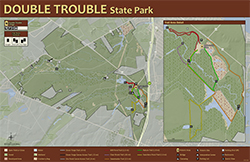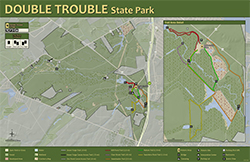All-Terrain Vehicles (ATVs)
Recreational use of ATVs is not permitted on NJ State Park Service property. This includes state parks, forests, recreation areas, golf courses, marinas, natural areas, historic sites, and preserves. Thank you for your help in protecting New Jersey’s natural and historic resources. [N.J.A.C. 7:2-3.4(d)]
Smoking
State law prohibits the smoking of tobacco and use of electronic smoking (vaping) devices in all state parks, forests, historic sites, recreation areas, golf courses and marinas. [N.J.P.L.2005, c.383 (C.26:3D-56)]
Alcohol
Alcoholic beverages are not permitted in state parks, forests, recreation areas, golf courses, marinas, natural areas, historic sites, and preserves. [ N.J.A.C. 7:2-2.6 ]
Keep Your Park Clean and Green
Protect plants and animals and care for your parks by taking your trash with you. Whatever you carry into the park, plan on carrying it out too. It’s like crowdsourcing trash management! Bring a bag or two for trash, recycling and cleaning up after your pet. There are no trash receptacles in this park. Thank you!
Swimming
No swimming. [N.J.A.C. 7:2-2.20]
Pets
Pets must always be on a leash no longer than six feet in length and under the control of the owner. Please clean up after your pets. [N.J.A.C. 7:2-2.8]
Tick Protection
Use insect repellent, wear light-colored clothing, tuck pants into socks, stay on trails, check yourself when you get home, shower and wash clothes immediately.
Be Bear Aware
Black bears are found throughout New Jersey. Do not approach or attract bears by making food available. Feeding bears is dangerous and illegal. Never run from a bear! To report an aggressive bear, call 1-877-WARN-DEP (1-877-927-6337) immediately. Please report any damage or nuisance behavior to the park office. Visit the New Jersey Division of Fish and Wildlife at www.njfishandwildlife.com for additional information on bear safety.
 Official Site of The State of New Jersey
Official Site of The State of New Jersey















